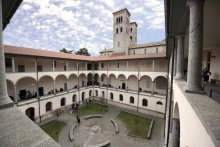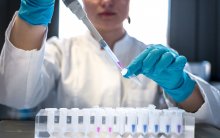Ph.D Course
Restricted access
3 years
Varese
Italian
DIPARTIMENTO DI MEDICINA E CHIRURGIA
Course description
Biomedical research is among the main keys to progress and well being in modern societies, and the profession of biomedical researcher is among the most intellectually exciting.
Nonetheless, in the last decades pursuing a career as researcher in biomedicine has become more and more difficult, mainly due to increased competition and decreased funding. Pressure of severe competition for funds and to obtain and secure a staff position in academic institutions are among the major factors leading researchers to breach their professional integrity by adopting questionable research practices and ultimately committing scientific misconduct.
The PhD program in Clinical and Experimental Medicine and Medical Humanities aims at addressing the unmet needs of young scientists by providing a comprehensive knowledge of the fundamental principles, methodologies and practices of preclinical and clinical research.
According to ENAI, "academic integrity" means "compliance with ethical and professional principles, standards and practices by individuals or institutions in education, research and scholarship" (1). Research integrity may be defined as active adherence to the ethical principles (honesty, trustworthiness, and high regard for the scientific record) and professional standards essential for the responsible practice of research (2).
Scientific misconduct results in harm to individuals and society, e.g. due to the development of ineffective and/or unsafe drugs or other therapeutics or just wasting money and resources in misconducted research activities, direct damage to science itself, by creating false leads for other scientists to follow, and/or forcing others to waste time, effort and money to reproduce fraudulent results, degradation of relations among scientists, between senior researchers and students, and between researchers and agency programme managers, damage to science through the undermining of the public’s trust in science (3).
Lack of knowledge/preparation about the realities and stresses of a scientific career as well as lack of awareness of the rules and standards of proper scientific conduct are among the main factors leading young researchers to scientific misconduct and career failure (3).
As a whole, this PhD program is thus addressed to young researchers planning to pursue their career into science and research, who would like to benefit from a thorough knowledge of the principles and methodologies underlying high quality research.
This PhD program is also part of an integrated project aimed at training “Physician-scientists”, defined as those with MD degrees who devote a substantial part of their professional effort to biomedical research, ranging from basic science, through translational and patient-oriented research, to advance medical sciences from the bench to the bedside and maintain rigorously high academic standards in basic and clinical research.
References
1. Tauginienė, L, Gaižauskaitė, I, Glendinning, I, Kravjar, J, Ojsteršek, M, Ribeiro, L, Odiņeca, T, Marino, F, Cosentino, M, Sivasubramaniam, S. Glossary for Academic Integrity. ENAI Report 3G [online].
2. Korenman SG. Teaching the Responsible Conduct of Research in Humans (RCRH). © 2006 University of California Regents.
3. OECD consensus report. Best Practices for Ensuring Scientific Integrity and Preventing Misconduct. 2007
What you need to know
All graduates with a master's degree and, in particular, graduates in medicine and surgery, dentistry, veterinary medicine, literature and philosophy, communication sciences and techniques, biological sciences, biotechnologies, pharmacy, psychology, chemistry and technology can access the doctorate. pharmaceutical, legal and economic sciences. The possession of an adequate cultural education and a personal path suitable to undertake the doctorate course will be the subject of specific and in-depth verification and evaluation during admission.
At the beginning of the first year the Teachers' Committee of the Course assigns to each PhD student a guiding professor within the College and possibly an external tutor, with whom the PhD student agrees on the three-year research program. The guide teacher and the eventual tutor are responsible for the orientation and supervision of the student's activities. The students enrolled in the course annually present a report on the results achieved, which is presented at an annual scientific meeting. The educational and training activities (compulsory and optional) associated with each year of the course are defined annually by the Academic Board.
Enrollment
This PhD is established for the XL cycle.
Are expected: 9 places
With scholarship: 7
Without scholarship: 2
To register, you must participate in the relevant call for applications.
Go to the call
Course committees and representatives
AGENO Walter
ANGELI Fabio
BELLINI Paolo
CALLEGARI Camilla
CAMPIOTTI Leonardo
COSCIA Marta
COSENTINO Marco (coordinatore)
DALLA GASPERINA Daniela
DENTALI Francesco
GORINI Ilaria
GUASTI Luigina
IACOVIELLO Licia
LICATA Marta
MARESCA Andrea Maria
MARINO Franca
MARTINELLI BONESCHI Filippo
NOVAZZI Federica
PICOZZI Mario
SEVERGNINI Paolo
SPANEVELLO Antonio
SQUIZZATO Alessandro
STORACE Erasmo Silvio
TANDA Maria Laura Piera
TERMINE Cristiano
For information
Centro Interdipartimentale di Ricerca in Farmacologia Medica
Università degli Studi dell'Insubria
Via Monte Generoso n. 71
21100 Varese VA
Tel. +39 0332 217401/397401
Fax: +39 0332 217409/397409
E-mail: farmacologia.medica@uninsubria.it





